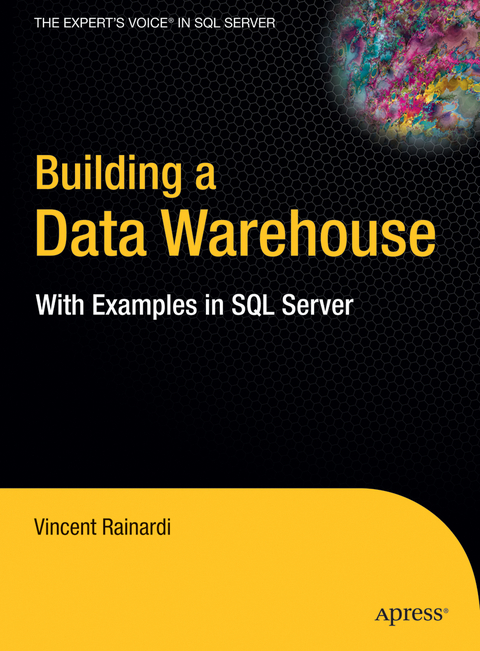
Building a Data Warehouse
With Examples in SQL Server
Seiten
2008
|
1st ed.
Apress (Verlag)
978-1-59059-931-0 (ISBN)
Apress (Verlag)
978-1-59059-931-0 (ISBN)
Building a Data Warehouse: With Examples in SQL Server describes how to build a data warehouse completely from scratch and shows practical examples on how to do it. Author Vincent Rainardi also describes some practical issues he has experienced that developers are likely to encounter in their first data warehousing project, along with solutions and advice. The relational database management system (RDBMS) used in the examples is SQL Server; the version will not be an issue as long as the user has SQL Server 2005 or later.
The book is organized as follows. In the beginning of this book (chapters 1 through 6), you learn how to build a data warehouse, for example, defining the architecture, understanding the methodology, gathering the requirements, designing the data models, and creating the databases. Then in chapters 7 through 10, you learn how to populate the data warehouse, for example, extracting from source systems, loading the data stores, maintaining data quality, and utilizing the metadata. After you populate the data warehouse, in chapters 11 through 15, you explore how to present data to users using reports and multidimensional databases and how to use the data in the data warehouse for business intelligence, customer relationship management, and other purposes. Chapters 16 and 17 wrap up the book: After you have built your data warehouse, before it can be released to production, you need to test it thoroughly. After your application is in production, you need to understand how to administer data warehouse operation.
The book is organized as follows. In the beginning of this book (chapters 1 through 6), you learn how to build a data warehouse, for example, defining the architecture, understanding the methodology, gathering the requirements, designing the data models, and creating the databases. Then in chapters 7 through 10, you learn how to populate the data warehouse, for example, extracting from source systems, loading the data stores, maintaining data quality, and utilizing the metadata. After you populate the data warehouse, in chapters 11 through 15, you explore how to present data to users using reports and multidimensional databases and how to use the data in the data warehouse for business intelligence, customer relationship management, and other purposes. Chapters 16 and 17 wrap up the book: After you have built your data warehouse, before it can be released to production, you need to test it thoroughly. After your application is in production, you need to understand how to administer data warehouse operation.
A bio is not available for this author.
to Data Warehousing.- Data Warehouse Architecture.- Data Warehouse Development Methodology.- Functional and Nonfunctional Requirements.- Data Modeling.- Physical Database Design.- Data Extraction.- Populating the Data Warehouse.- Assuring Data Quality.- Metadata.- Building Reports.- Multidimensional Database.- Using Data Warehouse for Business Intelligence.- Using Data Warehouse for Customer Relationship Management.- Other Data Warehouse Usage.- Testing Your Data Warehouse.- Data Warehouse Administration.
| Erscheint lt. Verlag | 7.1.2008 |
|---|---|
| Zusatzinfo | XVI, 523 p. |
| Verlagsort | Berkley |
| Sprache | englisch |
| Maße | 178 x 235 mm |
| Themenwelt | Informatik ► Datenbanken ► Data Warehouse / Data Mining |
| Mathematik / Informatik ► Informatik ► Software Entwicklung | |
| Schlagworte | Data Warehouse • SQL Server |
| ISBN-10 | 1-59059-931-4 / 1590599314 |
| ISBN-13 | 978-1-59059-931-0 / 9781590599310 |
| Zustand | Neuware |
| Haben Sie eine Frage zum Produkt? |
Mehr entdecken
aus dem Bereich
aus dem Bereich
Datenanalyse für Künstliche Intelligenz
Buch | Softcover (2024)
De Gruyter Oldenbourg (Verlag)
74,95 €
Auswertung von Daten mit pandas, NumPy und IPython
Buch | Softcover (2023)
O'Reilly (Verlag)
44,90 €


